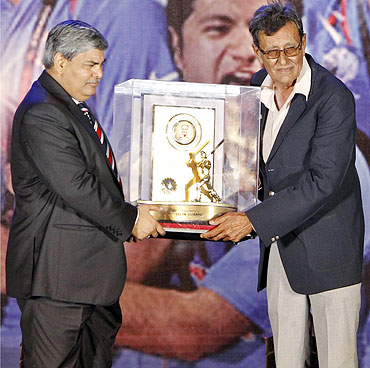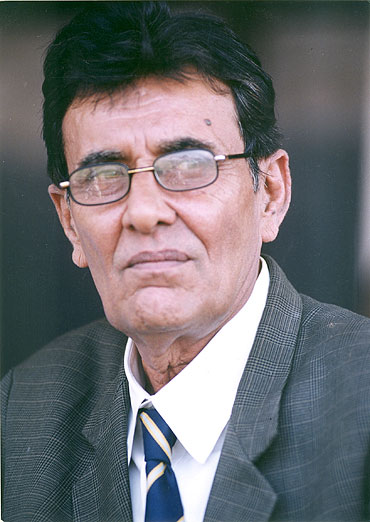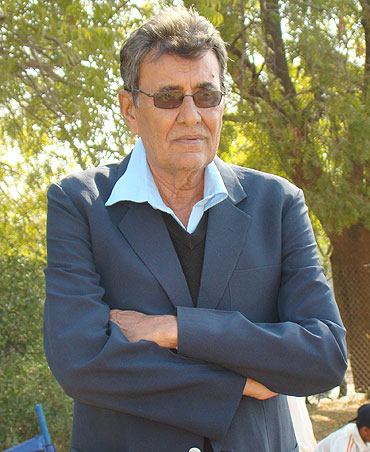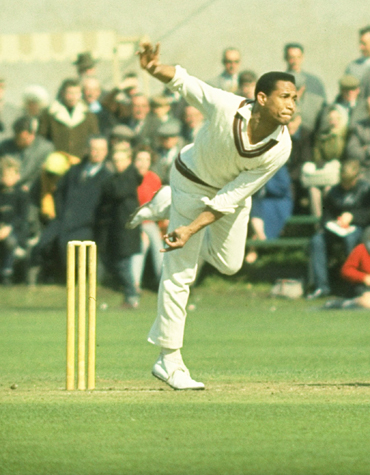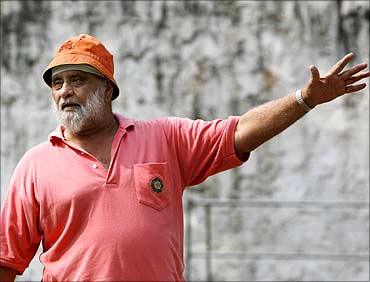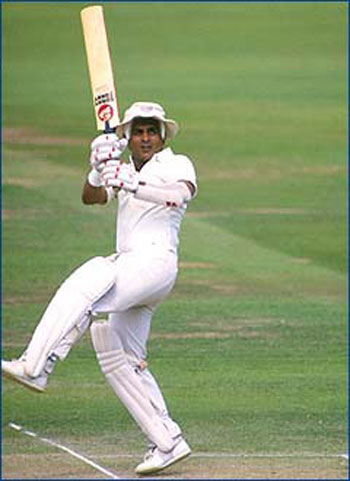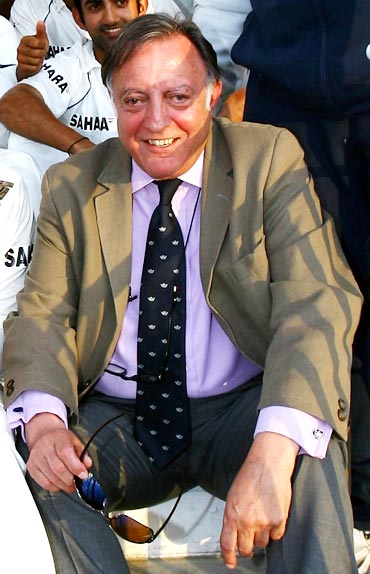 | « Back to article | Print this article |
'Happy that BCCI has recognised my contributions'
Former India swashbuckling batsman Salim Durrani goes down memory lane in an exclusive conversation with Haresh Pandya.
An elegant batsman with a silken touch, a slow orthodox left-arm spinner in the classical mould and an agile fielder anywhere on the ground.
The description sums up the kind of cricketer Salim Aziz Durrani, the latest recipient of the C.K. Nayudu Lifetime Achievement Award, was.
Besides his sublime cricketing skills, he was blessed with stunning looks. Indeed, handsome like a Hollywood hero and proud as a peacock, Durrani was every inch a people's cricketer. It was not without reason that he was called 'Prince Salim' by many. Few cricketers have been as popular as Durrani was at the pinnacle of his prowess. This dashing Afghanistan-born cricketer did not like to be dictated or ordered about by the authorities. He had to pay a price as he got to play only 29 Tests despite his acclaimed talents and match-winning ability.
But he has "no regrets" and is "very happy" representing India and doing what he did for the country in the "limited opportunities" he got.
Now 76, but still looking majestic, the unassuming Durrani, flanked by his sisters Meenu and Nigar (a former teacher in St. Ann's High School, Jamnagar, who never availed a single day's leave during her long academic career -- 1953-2000), and smoking cigarettes, opens up to Haresh Pandya at his simple home in Jamnagar soon after returning from Mumbai with the coveted C.K. Nayudu Lifetime Achievement Award.
How do you feel receiving the C.K. Nayudu Lifetime Achievement Award?
I am obviously very happy that the BCCI has recognised my contributions to Indian cricket. Just like to any cricketer, this award means so much for me. As you know, the last time I played for India was way back in 1972-73 and I retired from first-class cricket in 1980. It is a very long period. But it is a nice feeling that I am not forgotten!
'The Arjuna Award made me more determined to give my best'
How was it like meeting old cricketers as well as Mahendra Singh Dhoni and his World Cup-winning young brigade at the glittering awards function?
It was a great feeling. They are a bunch of highly- talented and exciting young cricketers -- Dhoni and his team. They have won the World Cup for the country after 28 years and it is a huge achievement. It was a happy feeling being amidst them that night. But I missed my old friends like M.L. Jaisimha, Ramakant Desai, Dilip Sardesai and Eknath Solkar; and senior players such as Subhash Gupte, G.S. Ramchand and Polly Umrigar. Their memories made me a bit emotional.
What did you and Dhoni talk about?
We exchanged greetings. I congratulated him on winning the World Cup and also on successfully leading the Chennai Super Kings to the IPL title. He, too, congratulated me on receiving the C.K. Nayudu Award. He is a nice, lively fellow, immensely talented and very, very intelligent. He has proved his leadership ability beyond any doubt.
You were seen conversing with Sachin Tendulkar, too, among many others. How do you rate him as a batsman?
Who am I to say anything about him? The whole world knows about him, his cricket and his feats. He is a role model for youngsters, not just for aspiring sportsmen. It is difficult to describe his batting. God has sent him on a mission on Planet Earth only for cricket. Yes, it has always been a great pleasure talking to him. He is so humble.
You were the first cricketer to receive the Arjuna Award almost soon after you made your Test debut against Australia at Mumbai in 1960. Which award is more important for you?
They are two totally different awards. While the Arjuna Award is given to a sportsperson who has done outstandingly in his or her chosen field, the C.K. Nayudu Award is exclusively for cricketers. I received the Arjuna Award at the very beginning of my Test career. So I felt very encouraged and it made me more determined to always give my best to my country. And, as I said, the C.K. Nayudu Award is in recognition of my talents and the resultant performances when I took the field donning the India cap. I must say I value both these awards.
'My sincerity was considered indiscipline'
Talking about your talents, one cannot help feeling that you did not do full justice to them. Although complimentary, you still carry labels like 'an enigmatic genius' and 'an unpredictable genius'. Don't you agree that your statistics, though not unimpressive, belie your great gifts as a player?
Mine was always a genuine approach to cricket. I never played for myself or my personal records. I consider it a sin to be selfish in any team sport, not just cricket. I always played for my country, for my team, and never for my personal glory. So many people who matter in cricket have praised my talents. It means I was capable of doing great things with the bat and the ball. With a bit of selfish approach I could have achieved a lot of things on a cricket field and cemented my place in the Indian team. But it was just not in my nature, in my blood.
Was it the only reason why you were never a regular member of the Indian team?
I don't know. I never tried to figure out. In fact, I was least bothered. I was humbly proud of my talents and my overall cricket. I played like a true team-man, always. I had full confidence in my ability and I did not require any godfather. But this does not mean I was insubordinate. I was ever ready to do whatever I could for the best interests of my team.
Yet, the selectors tended to drop you even when you had performed well. You were famously dropped after the first Test against the West Indies in Mumbai in 1966-67 despite scoring 55 and 17 and bowling very economically in both the innings. What exactly had happened?
I was hit on the knee during my innings of 55 and sustained a minor injury. Yet I took active part in the whole Test. Unfortunately, my wife fell seriously ill precisely at that time and I had to be by her side.
I was selected in the Central Zone team to play against the West Indies at Indore. The match was scheduled to be played before the start of the second Test in Kolkata. There was a gap of 12 days between the first and second Test, so I asked N.D. 'Mama' Karmarkar, the then BCCI executive secretary, not to consider me for the Central Zone-West Indies game because of my injury and the hospitalisation of my wife.
I also spoke to the Central Zone captain, Hanumant Singh. I assured everyone that I would join the Indian team in Kolkata well in time. But I could not reach the day before the Test. My sincerity was considered indiscipline and both the team manager Hemu Adhikari and the selection committee chairman were against my selection. I was dropped for the rest of the series and ignored for the 1967 tour of England.
'I had Sobers neck and crop'
Wasn't it the beginning of a long period in the wilderness for you, as the selectors began relying more and more on the new left-arm spinner, Bishen Singh Bedi? In fact, you did not play for India until the historic tour of the West Indies in 1971
Yes. No doubt there were not too many Test matches in Indian cricket's annual calendar in those years. But even then if you really knew my talents, and if you look at my overall India career, I did not deserve to figure in just 29 Tests. Maybe I should have played another 29 Tests. But what is the point talking about it now?
I was not unnecessarily sad about it then. And I am not even now. I was happy playing first-class cricket, which was as competitive in those days as today's international cricket. I have always held my dignity and self-respect as a cricketer and as a man.
In our days, too, there were people unfit to be national selectors.
Of course, with those two big wickets of Clive Lloyd and Garfield Sobers off successive deliveries in the second Test in Port of Spain, you not only paved the way for our historic triumph but also proved how much the Indian team had lost during your conspicuous absence all those years. What are your memories of those two dismissals?
As a bowler I always had a special skill. And having played against both Sobers and Lloyd in the past, I knew how to bowl against them and with what kind of a field. So when Ajit Wadekar gave me the ball, I told him to set the kind of field I wanted when Lloyd came to face me. And pretty soon I had Lloyd caught by Wadekar himself. And I did not really need any field against Sobers as I bowled him neck and crop.
I am really happy people still remember those two wickets of mine.
'I never refused to do anything for the sake of my team'
Again, you were dropped after the third Test, did not get picked for the 1971 tour of England and did not make a comeback until against Tony Lewis' side at home in 1972-73. Why do you think was it so?
I think the chairman of selectors, Vijay Merchant, -- I have always had high regard for him as a batsman -- wanted to bring some dramatic changes in the Indian team. So he began dropping experienced players like Jaisimha and me. But I had still a lot of cricket left in me. I think I compelled the national selectors to recall me on the strength of my consistently good all-round performances, which helped the Central Zone to their first ever Duleep Trophy triumph in 1971-72.
I remember eminent cricket writer K.N. Prabhu wrote a piece headlined 'Duleep Trophy or Durrani Trophy?'. The selectors just could not ignore me any longer.
But your selection for the second Test in Kolkata was said to be principally as a batsman only. How did you feel?
I had no problem with that. I took it as a compliment that the selectors considered me good enough to play me as a specialist batsman. And I responded pretty well by scoring a fifty in India's lowly second innings of 155, which proved very vital, as we won by 28 runs and came back in the series as we had lost the first Test in Delhi.
I sustained a minor knee injury in Kolkata, off the field, but went to Chennai, where I played two crucial innings of 38 each. My contribution in the second innings was very important. It was probably my best Test innings. Chasing a small target of 86 runs for victory, we lost five wickets in a jiffy. I think the English off-spinner Pat Pocock was bowling superbly. We eventually won by four wickets and took a 2-1 lead in the five-Test series.
Is it true that you refused to bowl, saying 'I am not a change bowler', when told by Wadekar after Bedi went off the field to attend to some injury?
It is nonsense. I never said so. Wadekar and I have always been the best of friends. And so are Bedi and I. I do not know why certain people have been spreading such canards just to tarnish my good image. I never refused to do anything for the sake of my team -- whether it was India, Rajasthan or any other side. People writing nonsense like that should have decency and courtesy to verify their facts with me before going to print. If anything, I bowled 15 overs in England's second innings in Chennai.
Gavaskar was one of the greatest batsmen of all-time
You did not play in the fourth Test in Kanpur and there were wide protests across the country. What was the actual reason for your omission?
Let me clarify that I was not omitted. I was not picked simply because I needed some rest as I was undergoing treatment following the injury sustained in Kolkata. But neither the BCCI secretary nor the selection committee chairman declared the real reason in the press and kept the public in the dark. So the cricket lovers, assuming that I was dropped despite my match-winning performance in Chennai, began protesting and demonstrating.
Even when the Test was going on in Kanpur, the agitation had started in Mumbai, with people shouting slogans carrying placards, 'No Durrani, No Test'. I was overwhelmed by the love of people and I thought I owed them something. I was happy that I did not disappoint them in the fifth Test in Mumbai, where I scored 73 and 37 and hit a few sixes when demanded by fans. Of course, it turned out to be my last Test.
Considering your all-round skills, especially your batting style, were you hoping to be picked in the Indian team for the inaugural World Cup in England in 1975?
Well, yes, to tell you honestly. I think I was about 38 at the time but I was very fit and in good form, too. I would certainly have loved to play in the first World Cup.
In fact, one of the few regrets of my life is that I never toured England with any Indian team.
You saw Sunil Gavaskar plundering runs in his very first Test series in the West Indies in 1971. What were your impressions of him?
For one so young and playing his maiden Test series, and that too against a team like the West Indies in the Caribbean, he was simply unbelievable. I think no one who saw him in the West Indies had any doubt about his class and bright future. I remember writing three letters from the Caribbean to his uncle and former India wicketkeeper Madhav Mantri as to how good and different from the rest of batsmen his nephew was.
I think Gavaskar, who is like a son to me, was one of the greatest batsmen of all-time. He was technically so perfect. And he was an intelligent captain, too.
'Vinoo Mankad was my idol'
Sir Frank Worrell was on record saying, after being impressed by your all-round show in the West Indies in 1961-62, which included a quicksilver hundred against the fearsome Wes Hall and company, that you were comparable with Sobers. Your comments?
It was magnanimous of Sir Frank to rate me so high. But I am not sure whether I was such a good cricketer. Unlike me, Sobers was never dropped and he enjoyed full confidence of the West Indies selectors. He was the greatest all-rounder ever. No one has come anywhere near him. Not yet.
What about Vinoo Mankad? What influence did he have on your career?
Doubtless he remains the greatest all-rounder India has ever produced. He was my idol. In my early days in cricket I used to be a left-arm medium-pace bowler as well as a right-arm off-spinner!
Mankad, who hailed from Jamnagar, used to visit the city often enough. My father Aziz Durrani, himself an outstanding cricketer of his time, sought Mankad's advice to curb what he believed to be my bad habit of bowling fast and spin with two different hands. Mankad knew I had the makings of a good left-arm orthodox spinner. He told my father to make me bowl only with my left arm by tying my right arm from behind! The trick worked. With my right hand being tied, I was unable to bowl quicker with my left-arm. So I had no other option but to bowl left-arm spin.
Did you call yourself a bowling all-rounder or a batting all-rounder?
I was a genuine all-rounder. I was equally good in both departments. In the initial stage of my career I was played as a bowler and later just as a specialist batsman. But I always struck a right balance and often proved my ability with the bat and ball.
Could you name a couple of key persons who helped you a lot during your career?
Two men immediately come to mind. Shatrushalyasinhji Jadeja, the present Jam Saheb of Jamnagar, always encouraged me and helped me in every possible way -- even when I was nobody and just beginning in the cricket world. He still does. As I used to wield heavy bats in those days, he gifted me a light Gray Nicolls bat on the eve of the second Test in Mumbai against England in 1963-64 and wanted me to score a century with it. Unfortunately, I missed my hundred by just 10 runs in the first innings.
Then there was Arun B. Vagh, the former captain and vice-president of the Khar Gymkhana, Mumbai. He always looked after me, stood by me in my good and bad days and lent me emotional and moral support. He passed away only recently.
'Pataudi was the best captain I played under'
Which was the best team you played against?
I think the England team to India in 1961-62, led by Ted Dexter, was very strong. Equally powerful was the West Indies side captained by Worrell in the Caribbean in 1961-62. Both teams were packed with star batsmen and bowlers. You were truly tested playing against them.
Who was the best captain you played under?
'Tiger' Pataudi. He was a genius as far as captaincy was concerned. He was thoroughly positive in his approach and very adventurous at times. At different times he had players bulging with talents -- Budhi Kunderan, Farokh Engineer, B.S. Chandrasekhar, Erapalli Prasanna, G.R. Viswanath and Pataudi himself. These are only some of the names. He had many players to choose from. The best part was he knew how to get the best out of each of his players. As for other captains, Nari Contractor and Wadekar were more defensive in their attitude. They were less adventurous and were more concerned about the team's safety.
Was there anything like match-fixing during your playing days?
No, I do not think so. We were amateur cricketers and played the game just for the sheer love of it. Had we been after money, I would have been a rich man today. But I am not. Cricket was not engulfed by the crass commercialism till Kerry Packer came on the scene in the late 1970s.
You could have made a lot of money by modelling. You must have had many offers, given your looks and personality?
I had offers, but I was not much interested. Cricket was my main interest. I modelled for only a couple of products, including a famous cigarette brand.
You were considered a playboy, a ladies' man, weren't you?
Well, it was not my fault! It was not that I had been chasing ladies. They were chasing me!
How was it like working in the 1973 Hindi film Charitra opposite Parveen Babi?
Very exciting. She was a sweet young lady and a very talented actress. I played a millionaire in that film. I wish I were one in my real life, too! My maternal uncle was in the film industry and he knew producer B.R. Ishara, who offered me that role in Charitra. My uncle had many friends in the Hindi cinema, including Dilip Kumar and Dev Anand.
You did not act in any other film. Or did you?
No, I did not. But I did come close to playing the hero in Subodh Mukherjee's 1971 super hit film Sharmilee opposite Rakhi Gulzar well before I worked in Charitra. Mukherjee had even hired an acting director to train me for my role. But because of my tight cricketing schedule I just could not find time for the film. As you know, the role finally went to Shashi Kapoor.
